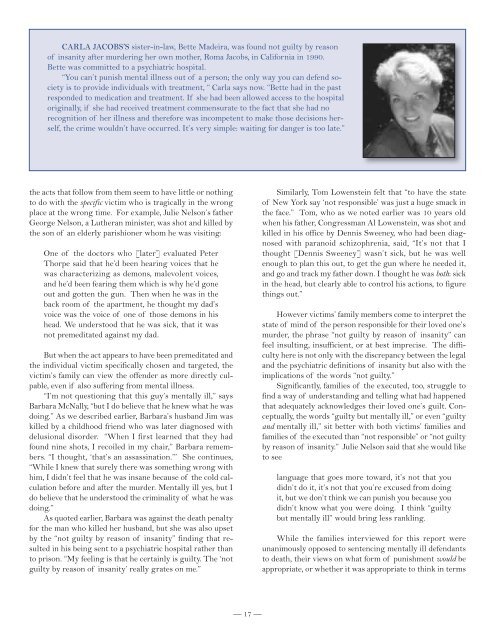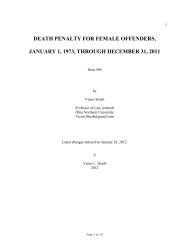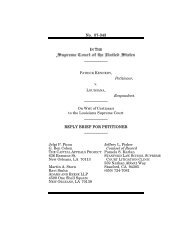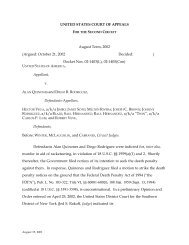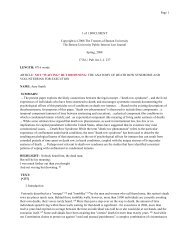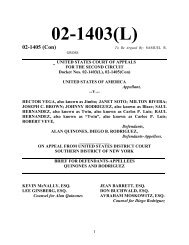CARLA JACOBS’S sister-in-law, Bette Madeira, was found not guilty by reasonof insanity after murdering her own mother, Roma Jacobs, in Cali<strong>for</strong>nia in 1990.Bette was committed to a psychiatric hospital.“You can’t punish mental illness out of a person; the only way you can defend societyis to provide individuals with treatment, “ Carla says now. “Bette had in the pastresponded to medication and treatment. If she had been allowed access to the hospitaloriginally, if she had received treatment commensurate to the fact that she had norecognition of her illness and there<strong>for</strong>e was incompetent to make those decisions herself,the crime wouldn’t have occurred. It’s very simple: waiting <strong>for</strong> danger is too late.”the acts that follow from them seem to have little or nothingto do with the specific victim who is tragically in the wrongplace at the wrong time. For example, Julie Nelson’s fatherGeorge Nelson, a Lutheran minister, was shot and killed bythe son of an elderly parishioner whom he was visiting:One of the doctors who [later] evaluated PeterThorpe said that he’d been hearing voices that hewas characterizing as demons, malevolent voices,and he’d been fearing them which is why he’d goneout and gotten the gun. Then when he was in theback room of the apartment, he thought my dad’svoice was the voice of one of those demons in hishead. We understood that he was sick, that it wasnot premeditated against my dad.But when the act appears to have been premeditated andthe individual victim specifically chosen and targeted, thevictim’s family can view the offender as more directly culpable,even if also suffering from mental illness.“I’m not questioning that this guy’s mentally ill,” saysBarbara McNally, “but I do believe that he knew what he wasdoing.” As we described earlier, Barbara’s husband Jim waskilled by a childhood friend who was later diagnosed withdelusional disorder. “When I first learned that they hadfound nine shots, I recoiled in my chair,” Barbara remembers.“I thought, ‘that’s an assassination.’” She continues,“While I knew that surely there was something wrong withhim, I didn’t feel that he was insane because of the cold calculationbe<strong>for</strong>e and after the murder. Mentally ill yes, but Ido believe that he understood the criminality of what he wasdoing.”As quoted earlier, Barbara was against the death penalty<strong>for</strong> the man who killed her husband, but she was also upsetby the “not guilty by reason of insanity” finding that resultedin his being sent to a psychiatric hospital rather thanto prison. “My feeling is that he certainly is guilty. The ‘notguilty by reason of insanity’ really grates on me.”Similarly, Tom Lowenstein felt that “to have the stateof New York say ‘not responsible’ was just a huge smack inthe face.” Tom, who as we noted earlier was 10 years oldwhen his father, Congressman Al Lowenstein, was shot andkilled in his office by Dennis Sweeney, who had been diagnosedwith paranoid schizophrenia, said, “It’s not that Ithought [Dennis Sweeney] wasn’t sick, but he was wellenough to plan this out, to get the gun where he needed it,and go and track my father down. I thought he was both: sickin the head, but clearly able to control his actions, to figurethings out.”However victims’ family members come to interpret thestate of mind of the person responsible <strong>for</strong> their loved one’smurder, the phrase “not guilty by reason of insanity” canfeel insulting, insufficient, or at best imprecise. The difficultyhere is not only with the discrepancy between the legaland the psychiatric definitions of insanity but also with theimplications of the words “not guilty.”Significantly, families of the executed, too, struggle tofind a way of understanding and telling what had happenedthat adequately acknowledges their loved one’s guilt. Conceptually,the words “guilty but mentally ill,” or even “guiltyand mentally ill,” sit better with both victims’ families andfamilies of the executed than “not responsible” or “not guiltyby reason of insanity.” Julie Nelson said that she would liketo seelanguage that goes more toward, it’s not that youdidn’t do it, it’s not that you’re excused from doingit, but we don’t think we can punish you because youdidn’t know what you were doing. I think “guiltybut mentally ill” would bring less rankling.While the families interviewed <strong>for</strong> this report wereunanimously opposed to sentencing mentally ill defendantsto death, their views on what <strong>for</strong>m of punishment would beappropriate, or whether it was appropriate to think in terms__ 17 __
KIM CRESPI’S 5-year-old twin daughters, Samantha and Tessara, were killed by their father,David Crespi, during a psychotic episode that the family now suspects was caused by a toxic reactionto anti-depressant medication. Kim explains that David had been dealing with recurringepisodes of severe insomnia, anxiety, and depression.“Each time,” Kim remembers, “we sought help, listened to advice, went to therapy, and followedthe prescribed medication. We were not warned about potential side effects of medication,particularly the possibility of mania and psychosis.”Rather than face the possibility of a death sentence, David Crespi pled guilty, and he is nowserving two consecutive life sentences in North Carolina prison.In her public statement at the launch of the NAMI/MVFHR “Prevention, Not Execution”project, Kim said, “I am here today with other family members of murder victims, feeling our shared losses. I am heretoday with family members of people who have been executed, deeply aware of how close our family came to sufferingthat additional loss too. And I am here with others who are family members of both the victim and the person responsible<strong>for</strong> the crime, saying that the death penalty is not the way to respond to tragedies like ours.”of punishment as opposed to treatment, definitely varied.That diversity of opinion derives from the varying detailsof each specific story and from the victims’ family members’range of personal responses and views. Collectively, theirremarks highlight the questions with which victims’ familiesgrapple and demonstrate that opposition to the deathpenalty is not synonymous with a belief in complete absolutionof responsibility.Pat Webdale vividly remembers struggling with thequestion of how to view the culpability of Andrew Goldstein,who pushed Pat’s daughter Kendra to her death in theNew York City subway: “I was tortured by the question – Iwrote an essay <strong>for</strong> myself, should the mentally ill be held accountable?I used to lie awake at night thinking about it. Idefinitely didn’t want him killed, but I definitely needed aconsequence. That’s the guts of it.”The idea of a legal outcome that acknowledges the defendant’sguilt while also taking the exigencies of his or hermental illness into account was compelling to some of thefamily members interviewed <strong>for</strong> this report, making thephrase “guilty but mentally ill” conceptually attractive. Butin practice, a “guilty but mentally ill” verdict, which is anoption <strong>for</strong> jurors in several states, does not differ significantly(or at all) from an ordinary “guilty” verdict. One professorof law and psychiatry called the “guilty but mentallyill” verdict “a sham,” adding that “it is nothing more or lessthan another guilty verdict.” 14 Particularly significant <strong>for</strong>our discussion is that a “guilty but mentally ill” verdict doesnot prohibit a death sentence, and, though it is not common,it has happened that a defendant has been found “guilty butmentally ill” and then sentenced to death.In theory, a “guilty but mentally ill” verdict would seemto offer a compromise between the extremes of punishmentwithout-treatmentand treatment-without-accountability.But just as jurors can misunderstand (or, in some states, failto be told) the consequences of a “not guilty by reason of insanity”finding, believing that it will result in a defendant’s“getting off ” entirely, so can they misunderstand the consequencesof a guilty but mentally ill finding, believing that itwill result in the defendant’s getting mental health treatmentin prison (or being rendered ineligible <strong>for</strong> the deathpenalty). Says Amnesty International:In theory, defendants found guilty but mentally illwere supposed to be guaranteed mental health careduring their incarceration. However this has largelyproved illusory and the “guilty but mentally ill” verdicthas been widely criticized. It appears to havebeen a legislative response aimed at assuaging publicoutrage following particular high-profile cases,rather than a more preventive and treatment approachto people with mental illness who commitserious crimes.And, as we can infer from this summary, the questionof victims’ family members’ response to this verdict has notbeen given much, if any, consideration. It may be temptingto assume that victims’ families fall under the rubric of ageneral public outraged by policies that are insufficientlytough on crime; if that were so, victims’ families, too, mightbe assuaged by a “guilty but mentally ill” option that didn’tactually differ from “guilty” in any meaningful way. But victims’families are both less monolithic and more nuanced intheir attempts to wrestle with questions of criminal responsibilityin offenders with mental illness than this assumptionallows.A couple of states 15 also offer a “guilty except <strong>for</strong> insanity”option, which is essentially another term <strong>for</strong> “notguilty by reason of insanity,” as the defendant who receivessuch a verdict will be committed to a psychiatric hospitalrather than sent to prison. But with “guilty except <strong>for</strong> insanity,”the individual is then placed under the supervisionof an independent Psychiatric Security Review Board <strong>for</strong> aslong as the maximum sentence that could have been imposedhad the person been found guilty. These PSRBs, much likeparole boards, take administrative responsibility <strong>for</strong> those14Ralph Slovenko, Physician’s Weekly, October 27, 1997, Vol. XIV, No. 40.15Specifically, Oregon, Connecticut, and Arizona.__ 18 __


